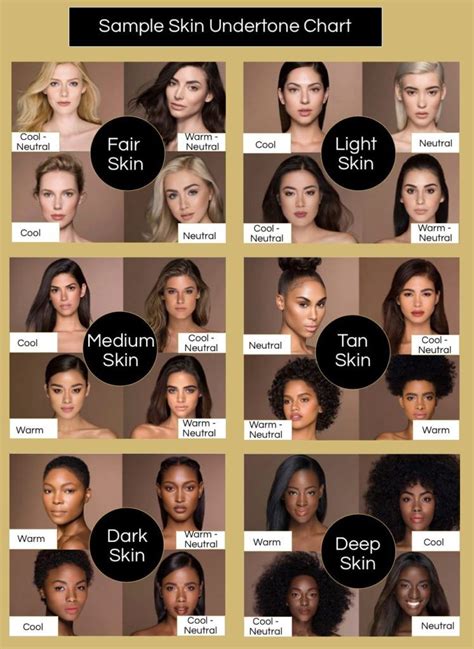Deciding on a new hair color can be an exciting yet daunting task. With countless shades and tones to choose from, it’s easy to feel overwhelmed. To help you navigate this process, we’ve compiled a comprehensive guide that will assist you in finding the hair color that perfectly complements your skin tone.

Determining Your Skin Undertone
The first step in selecting the right hair color is determining your skin’s undertone. This underlying hue can be categorized into three primary types:
- Cool Undertones: Skin characterized by a pink, bluish, or reddish tint when exposed to sunlight. Veins on the wrist tend to appear blue or purple.
- Warm Undertones: Skin that exhibits a yellow, golden, or peachy hue under sunlight. Veins on the wrist often appear green.
- Neutral Undertones: Skin that does not display a distinct cool or warm undertone. Veins may appear a mix of blue and green.
Color Theory and Hair Color Selection
Once you’ve determined your skin’s undertone, you can begin exploring hair colors that harmonize with it. Color theory plays a vital role in this process:
- Complementary Colors: Colors that sit opposite each other on the color wheel, such as red and green. When placed next to each other, they create a contrasting and striking effect.
- Monochromatic Colors: Shades of the same color, such as various hues of blonde or brown. They offer a cohesive and harmonious look.
- Analogous Colors: Colors that are adjacent to each other on the color wheel, such as blue, green, and yellow. They create a natural and subtle transition.
Hair Color Recommendations Based on Skin Undertone
Cool Undertones
Best Hair Colors:
- Dark: Deep chocolate brown, black
- Medium: Ash blonde, cool brown
- Light: Platinum blonde, silver
Avoid: Warm shades like golden blonde or copper
Warm Undertones
Best Hair Colors:
- Dark: Warm chocolate brown, mahogany
- Medium: Caramel, honey blonde
- Light: Golden blonde, strawberry blonde
Avoid: Cool shades like ash blonde or blue-black
Neutral Undertones
Best Hair Colors:
- Dark: Black, chestnut brown
- Medium: Natural brown, auburn
- Light: Blonde, light brown
Avoid: Extreme shades like platinum blonde or black
Additional Factors to Consider
In addition to your skin undertone, other factors to consider when selecting a hair color include:
- Eye Color: Your hair color should complement your eye color. For example, brown eyes pair well with warm shades, while blue eyes suit cooler tones.
- Personal Style: Choose a hair color that aligns with your personality and fashion preferences.
- Maintenance: Consider the level of maintenance required for your desired hair color. Lighter shades typically require more frequent touch-ups.
- Lifestyle: Your hair color should reflect your lifestyle and activities. For example, a vibrant red may not be suitable for a professional environment.
Tables for Selecting Hair Color Based on Skin Undertone
| Skin Undertone | Best Hair Colors |
|---|---|
| Cool | Dark chocolate brown, black, ash blonde, cool brown |
| Warm | Warm chocolate brown, mahogany, caramel, honey blonde |
| Neutral | Black, chestnut brown, natural brown, auburn |
| Hair Color | Skin Undertone |
|---|---|
| Dark Chocolate Brown | Cool, Neutral |
| Black | Neutral |
| Ash Blonde | Cool |
| Caramel | Warm |
| Honey Blonde | Warm |
| Golden Blonde | Warm, Neutral |
| Strawberry Blonde | Warm |
| Platinum Blonde | Cool |
FAQs
- Can I dye my hair from dark to light without bleaching it?
Yes, it’s possible to go from dark to light without bleach, but the process can be gradual. Using a color-removing shampoo can help lift the color without damaging your hair.
- How often should I get my hair dyed?
The frequency of hair dye touch-ups depends on the type of dye used and the growth rate of your hair. Permanent dyes typically last 6-8 weeks, while semi-permanent dyes last 4-6 weeks.
- What is the best way to maintain my hair color?
To maintain your hair color, use color-protecting shampoos and conditioners, avoid heat styling, and get regular trims to remove split ends.
- How do I choose the right hair stylist for my color transformation?
Look for a stylist who specializes in color and has experience working with your hair type and skin tone. Check their portfolio and reviews to ensure they align with your desired results.
- What if I’m not satisfied with my new hair color?
If you’re not happy with your new hair color, don’t panic. Consult with your stylist to explore color correction options or wait for the color to fade naturally.
- Can hair dye damage my hair?
Hair dye can damage your hair, especially if it’s bleached or used excessively. To minimize damage, use high-quality dyes, follow the instructions carefully, and take breaks between dye applications.
- How can I find inspiration for new hair colors?
Explore hair magazines, celebrity style blogs, and social media platforms like Pinterest and Instagram to discover new hair color trends and ideas.
- What are some tips for choosing a hair color for my skin tone that I haven’t thought of?
Consider the shape of your face, your hair texture, and your personal coloring when selecting a hair color. Warm tones can brighten a sallow complexion, while cool tones can enhance a fair skin tone.
